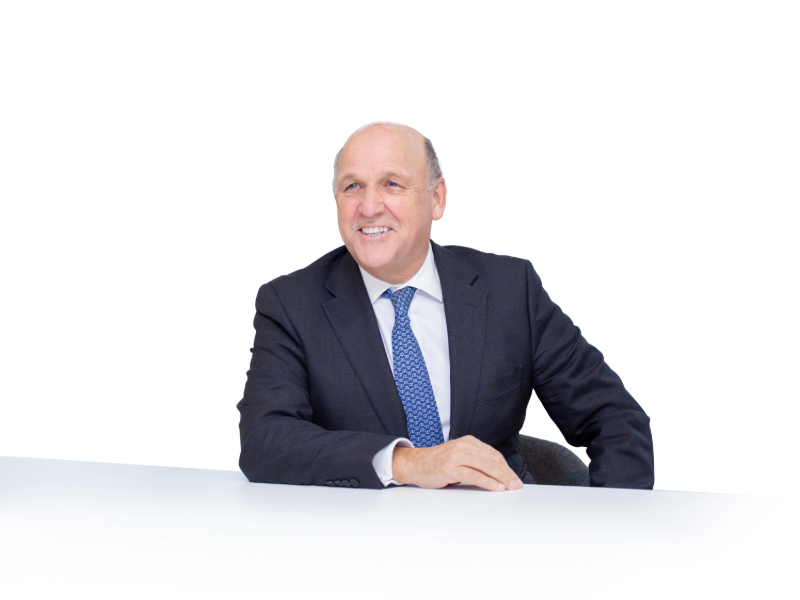
Committed to delivering value
As expected, this has been a transitional year under our new CEO, who joined the Group in January 2024. Adolfo laid out his strategic plan and priorities for the future success of the Group in June at our first Capital Markets Day for a number of years.
We acknowledge that the Group’s financial performance has not been where it needs to be and, at the event, he and the wider Executive Team unveiled forward-looking strategic priorities to improve both operational delivery and financial performance, alongside introducing the strategic themes of Better Technology, Better Delivery, Better Efficiencies and Better Company.
The Group also outlined its medium-term financial targets: an adjusted operating margin of 6 – 8%, up from 3.5% in 2023; positive sustainable free cash flow from 2025; and low to mid-single digit revenue growth in the medium term, alongside a number of non-financial KPIs which will be tracked over the course of this journey to monitor ongoing progress.
The Board are committed to delivering on the Group’s priorities, and ensuring our progress generates returns.
Since joining Capita as CEO at the start of 2024, I have spent significant time engaging with key stakeholders of the Group, including customers and colleagues across all Capita geographies. I have seen the high value that we deliver consistently to customers, the criticality of our services, and the skills and passion of our teams when it comes to delivering better outcomes on behalf of our customers. This is a great foundation to work from.
2024 has been a very busy year learning about the business, actioning many initiatives which will be key for Capita’s business and financial improvement journey, and building new, strong partnerships with technology hyperscalers. This culminated in June with the launch of our new strategy, which redefines our focus to deliver a Better Capita underpinned by our strategic themes of Better Technology, Better Delivery, Better Efficiency and Better Company.
In short, our value proposition needs to be more competitive and differentiated, through a lower cost base, automation and innovation. We are removing unnecessary costs to put us in a position to fund our profitable growth. Better Capita means becoming more efficient and spending less, digitising our offerings by having more standardised and repeatable propositions, strongly leveraging technology partnerships, being more precise in our delivery, and evolving governance and our culture.
As we look forward to 2025 and beyond, we will continue with the same areas and themes unveiled at the Capital Markets Day in 2024, such as: finding additional efficiencies; improving our sales effectiveness; increasing differentiation of our services, products and value propositions through innovation, further automation and higher quality of delivery; and continuing to build a better Capita, with and for our colleagues, after a challenging year of changes and difficult decisions.
I am increasingly confident in the progress and potential of our business improvement journey and the feedback we are receiving from our customers.

We have developed our strategy which will enable us to win and grow in the future.

Driving efficiency and innovation
Adjusted revenue decline of 8.0% reflects the impact of contract losses in prior years, the cessation of lower margin service lines, and the reduction in volumes in the Contact Centre telecommunications vertical.
The 5.5% step-up in adjusted operating profit reflected the benefit from the ongoing cost reduction programme, more than offsetting the impact of the revenue trends noted above and the non repeat of one-offs from the prior year.
Cash generated from operations excluding business exits decreased, as expected, from £26.5m to £16.2m, driven by the impact of mobilisation delays, a more sustainable approach to working capital, and an increase in cash costs to deliver the cost reduction programme, partly offset by a reduction in the direct cash cost of the 2023 cyber incident and pension deficit contributions.
Free cash flow excluding business exits in the year ended 31 December 2024 was an outflow of £122.3m (2023: outflow £123.6m). This reflects the reduction in cash generated from operations, partly offset by lower net capital lease payments, following the rationalisation of our property estate, and lower tax outflows.
In December, reflecting on the progress made ahead of schedule with £140m annualised savings already delivered, and the opportunity to use AI and gen AI, we increased the cost reduction target further to £250m.
Four operating segments focused on distinct market and client needs.
Capita Public Service | Capita Experience | ||
|---|---|---|---|
Contact Centre | Pension Solutions | Regulated Services, including closed book Life & Pensions | |
Adjusted revenue: £1,387.2m | Adjusted revenue: £650.9m | Adjusted revenue: £179.0m | Adjusted revenue: £152.0m |
Adjusted operating profit: £89.1m | Adjusted operating profit: (£5.9m) | Adjusted operating profit: £28.1m | Adjusted operating profit: £12.6m |
£2,421.6m
Reported revenue
(2023: £2,814.6m)
(0.4%)
Reported operating margin
(2023: (1.8%))
£(122.7)m
Reported free cash flow
(2023: £(154.9)m)
£2,369.1m
Adjusted revenue
(2023: £2,575.8m)
4.0%
Adjusted operating margin
(2023: 3.5%)
£(122.3)m
Free cash flow before the impact of business exits
(2023: £(123.6)m)
4.54p
Reported earnings/(loss) per share
(2023: (10.60)p)
2.11p
Adjusted basic earnings/(loss) per share
(2023: (0.20)p)
64%
Employee engagement index
(2023: 67%)
+28pts
Customer net promoter score
(2023: +16pts)
(36.3%)
Total shareholder return (TSR)
(2023: (9.3)%)
26.3m gross tonnes
CO2 emissions (location based) Scope 1,2 and 3
(2023: 40.5m gross tonnes)
-33pts
Employee net promoter score
(2023: -4pts)
51/48/1%
Diversity: gender F/M/other and did not disclose
(2023: 50/49/1%)
35%
Reduction in carbon footprint (location-based)
(2023: 37%)
22%
Voluntary employee turnover
(2023: 25%)
38/19%*
Diversity: ethnicity (White/Black, Asian and minority ethnic)
(2023: 37/22%)
*42% chose not to respond or specify
37%
Reduction in carbon footprint (market-based)
(2023: 58%)




